Vine Deloria Jr. Theological Symposium
Lutheran School of Theology at Chicago
November 15 and 16, 2022
THEME: AM I MY SISTER’S KEEPER? MISSING AND MURDERED INDIGENOUS WOMEN AND GIRLS
Over the last two decades, dedicated Indigenous leaders, families, organizers, activists, and organizations have worked in vital ways to shine a light on the ongoing Missing and Murdered Indigenous Women (MMIW) epidemic – and the thousands of women and girls who have been disappeared or murdered on Turtle Island (North America). Today, the movement is growing, not only to bring awareness to the issue, but also to create change in governmental and law enforcement systems that will finally begin to bring justice and prevent more stolen relatives. As we gather to learn more about MMIW and the movement to bring justice for our Indigenous sisters and the families who miss them, let us ask how the Church might start to support these critical efforts.
Tuesday, November 15 at noon
LEARNING LUNCH: MMIWG: POLICY AND ADVOCACY
Portia Skenandore Wheelock (Oneida)
Join us via Zoom
Tuesday, November 15 at 7 p.m.
SYMPOSIUM LECTURE: MMIWG: A THEOLOGICAL RESPONSE
Dr. Kelly Sherman-Conroy (Oglala Lakota)
Augustana Chapel or join us via Zoom
Wednesday, November 16 at 11:15 a.m.
SERMON BY DEACON COLLEEN BERNU (OJIBWE)
Augustana Chapel or join us via Zoom
Wednesday, November 16 at 12:30 p.m.
LEARNING LUNCH: MMIWG: ONE FAMILY’S STORY
Pamela Fencer-Smith (Cherokee)
Join us via Zoom
Wednesday, November 16 at 7 p.m.
PANEL PRESENTATION MMIWG: A PANEL OF ACTIVISTS
Roxanne White (Nez Perce)
Cherrah Giles (Muscogee and Cherokee)
Leanne Guy (Diné)
Speaker Bios
Pamela Smith
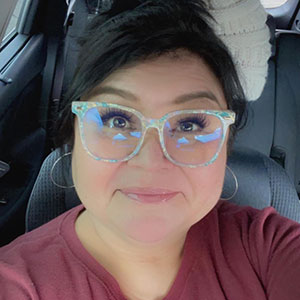
Osiyo! My name is Pamela Fencer-Smith and I am a mother, sister, auntie, & friend to the most amazing humans and a proud citizen of the Cherokee Nation of Oklahoma.
Pamela is the Auntie of Missing Aubrey Dameron of Grove, Oklahoma and for the past 3 years, she has advocated for others who need help finding their loved one or seek justice for their Murdered relative in Indian country.
Dr. Kelly Sherman-Conroy
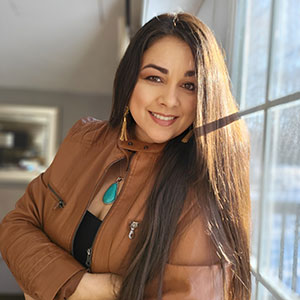
Dr. Kelly Sherman-Conroy; Mato Wašté Winyan (Good Bear Woman), has grounded her life in the Holy Spirit and the deep spiritual practices intertwined between her Lakota identity and Christian beliefs. As a proud member of the Oglala Lakota Nation, Kelly dedicates her time to social justice, racial reparations, trauma and healing, and Storytelling. Kelly has a Doctoral degree in systematic theology from Luther Seminary. Her work focuses on Lakota Spirituality, history, and culture, and how these forms inform Christianity and move past trauma to healing. Kelly is also a liturgist, having written liturgies for the ELCA, Festival of Homiletics, and World Council of Churches to name a few.
Walking with people of all cultures, she actively provides ministry around the exploration of intersections of identity, personal narratives, and faith. Kelly has two decades of teaching and leading in ministry and keeps busy by actively being involved in the Minnesota Council of Churches (Executive Board of Directors); American Indian Alaska Native Lutheran Association Inc. (Executive Council); MYLE- Multicultural Youth Leadership Event Lead; ELCA Youth Ministry Network (Board of Directors); ELCA Authentic Diversity Committee; Director of Public Ministry at Nativity Lutheran Church, Minneapolis; Convenor of the Twin Cities Interfaith Movement Chaplains.
Portia Skenadore Wheelock
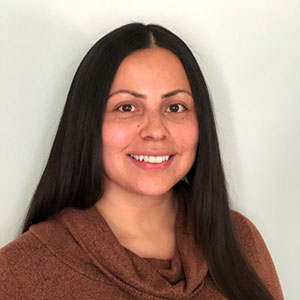
Portia Kay^nthos Skenandore-Wheelock manages the Native American Advocacy Program for the Friends Committee on National Legislation, lobbying on legislation that affects Native communities. She chairs an interfaith working group on Native American issues, and advocates for legislation to address critical issues in Indian Country, such as the crisis of Missing and Murdered Indigenous Women (MMIW) and the legacy of Indian boarding schools.
Portia is a citizen of the Oneida Nation of Wisconsin and spent her formative years traveling back and forth between the Oneida Indian Reservation in Wisconsin and the Oneida homelands in upstate New York, and visiting other tribal nations around the country. She studied democracy and justice studies at the University of Wisconsin – Green Bay and received her law degree from Syracuse University.
Prior to joining FCNL, Portia was a law clerk for the Office of Tribal Justice at the U.S. Department of Justice, a liaison between the Oneida Nation Family Court and Child Support Agency, and a director for a nonprofit organization serving tribal communities.
Portia spends her free time with her family continuing traditional cultural practices within the Haudenosaunee ceremonial calendar. Portia is also an Oneida silver work artist and has had her pieces featured in museum exhibits and art shows.
Leanne Guy
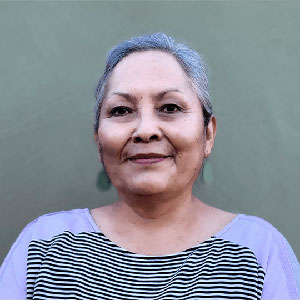
Leanne Guy, Diné, is of the Tó’ áhani (Near to water) clan and is born for the Tódichi’ii’nii (Bitter Water) clan. Her chei (maternal grandfather) is from the Tábaahí (Waters Edge) clan, and her nali (paternal grandfather) is from the Tachii’nii (Red Running into the Water) clan. This is who she is as a Diné woman. She is a mother, grandmother, sister, auntie, and works for the betterment of tribal communities.
Leanne has over 25 years of experience in tribal community health promotion, disease prevention, and public health and safety initiatives. She has worked to help increase the capacity of tribal programs to organize, develop and implement public health intervention and prevention strategies for increased wellness, healing, safety, and justice. She is a member of numerous national, state, and tribal boards, task forces, and committees including the Alliance of Tribal Coalitions to End Violence, National Indigenous Women’s Resource Center, National Congress of American Indian’s Violence Against Women Task Force and Arizona’s Missing and Murdered Indigenous Women and Girls Study Committee.
Currently, Leanne is the founding executive director of the Southwest Indigenous Women’s Coalition, Arizona’s tribal domestic and sexual violence coalition. Prior to this, she was the executive director of a nonprofit, community-based domestic violence and sexual assault services program located on the Diné Nation. Leanne has also worked for the Inter-Tribal Council of Arizona, Inc. and the Indian Health Service in the area of HIV/AIDS, cancer prevention, and women’s health. The many blessings Leanne has experienced in working with tribes is getting to know the people—hearing their stories, observing their customs, seeing their land, and sharing in laughter and in their food.
Cherrah Giles
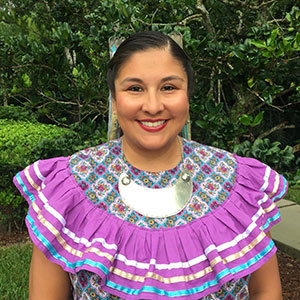
Cherrah Giles is Muscogee and Cherokee, from the Fuswvlke (Bird Clan) and Rekackv (Broken Arrow) Tribal Town. She has previously served over ten years as a legislator on the Muscogee National Council and to-date, she has been the youngest female at 24 years old, elected to the Council and first female elected as Second Speaker. Cherrah has also served her Tribal Nation as the first Cabinet Secretary of the Department of Community & Human Services and seated to the Muscogee Reservation Protection Commission.
Cherrah is former Chairwoman of the National Indigenous Women’s Resource Center (NIWRC), a non-profit organization created to serve as the national resource center to address domestic violence and enhance safety of indigenous women and their children. As a survivor of domestic violence and childhood sexual assault, Cherrah has shared her story to advocate for the needs within Indian Country to the United States Congress and the United Nations. She is a recipient of the Pillars of Empowerment Unsung Hero Award for her contributions to end domestic violence, dating violence, sexual assault, and stalking.
Cherrah is a Licensed Master Social Worker (LMSW) and has worked over 20 years with a range of experience. Highlights of her professional career include being a child welfare investigator, working in homeless programs, instructor at the College of the Muscogee Nation, breast cancer support group facilitator, extensive medical social work, and administration of twelve tribal direct services programs. She earned her undergraduate and master’s degrees from the University of Oklahoma and today is Deputy Project Manager for the Bureau of Indian Education’s Behavioral Health and Wellness Program.
Roxanne White
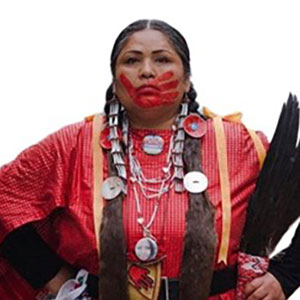
She is the executive director and founder of Missing, Murdered Indigenous Women, People, and Families.
Roxanne White is a fearless and dedicated grassroots organizer and social justice advocate who has dedicated her work to Indian Country. She is Nez Perce, Yakama, Nooksack, and Gros Ventre. She is recognized nationally for her work on issues related to Missing and Murdered Indigenous Women and People for her work with Native families and communities seeking justice and healing.
She is also known her work on human trafficking in Native communities. Roxanne works to amplify and center the voices of impacted survivors and families of Missing, Murdered Indigenous Women and People across North America. She stands on the front lines for Indigenous rights and environmental justice. She embodies vibrant Indigenous leadership through the resilience of culture, ceremony with a lens of historical trauma.
Roxanne is a family member of MMIWP and the granddaughter of boarding and mission school survivors. She is a survivor of human trafficking, domestic violence, childhood abduction, and sexual abuse. She draws on her lived experience to empower and support survivors, youth and impacted families and communities throughout urban, rural native communities throughout Indian Country.
Colleen Bernu
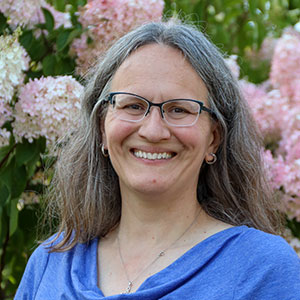
Colleen Bernu is a Minister of Word and Service in the ELCA where she serves as Director for Evangelical Mission and Synod Minister for Diversity, Equity and Inclusion in Northeastern Minnesota Synod. Colleen, a descendant, first generation, of the Fond Du Lac Band of Lake Superior Chippewa, lives on the Fond Du Lac Indian Reservation with her family and considers Solon Springs, Wisconsin, on the traditional lands of her community, home. Colleen is a former teacher and is dedicated to using her training and experience to expand diversity, equity, inclusion and belonging, bridging diverse communities through a process of truth-telling that promotes the formation of a common memory in order for communal healing to begin. Prior to her call to Synod staff, Colleen served as mission developer for Together Here Ministries – a ministry that creates space for transformational change by engaging in learning, listening and relationship building between diverse people groups and communities within the Northeastern Minnesota Synod.